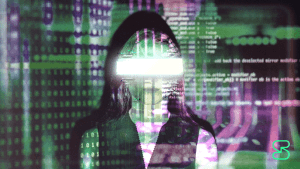The Matrix vs. The Metaverse
November 09, 2021 / Alex LintonPrivacy
“Choice is an illusion created between those with power and those without.”
Chock-full of sexy leather-clad people dodging bullets in slo-mo and cypherpunk-inspired philosophy, the Wachowski sisters' The Matrix spawned a cultural tidal wave when it first hit cinemas in ‘99. It introduced the mainstream to new questions and ideas which have remained a mainstay for late night campfire chats and half-drunken bar conversations ever since. While ‘we’re living in the matrix, man’ is a played-out calling card for edgy teenagers and tin-foil-hatters, the cyberpunk-horror-dystopia of The Matrix might be more relevant now—over 20 years after its initial release—than ever before.
When Mark Zuckerberg introduced Facebook’s new brand—Meta—in an hour-long Connect 2021 presentation, I (along with others no doubt) had a nagging thought throughout: is this what our matrix looks like? It might be dressed up like a cheerful big-eyed cartoon character, but the live-streamed exhibition sparked a sickening feeling of tech vertigo — that the technological heights we’re reaching are getting dizzying, and that we might be going too far, too fast. Despite that feeling, Mark Zuckerberg is right — the metaverse will completely revolutionise the way we act and interact, and the development of the metaverse us quickly becoming a runaway train that nobody can stop. It has the potential to completely alter the fabric of our reality — or at least reality as we know it.
But we definitely don’t want Meta to be in control of this reality-bending technology. I’m not saying that Meta’s metaverse would inevitably lead to the dystopian world we see in The Matrix, but the prospect of a future where Meta’s tech is even more pervasive than it is currently is dreadful. In The Matrix, the metaverse/matrix was a digital refuge from a fallen world, a digital play-pen for physical prisoners in a complete dystopia. Our metaverse won’t be quite like that—at least you’d hope not—but as the world buckles under the pressure of political and social unrest, a global pandemic, and the climate crisis, it’s easy to see the metaverse becoming a digital bastion for people to escape from the horrors of our physical world.
The internet already fosters escapism like no other technology we’ve ever created, and the metaverse is the next leap in our increasingly tech-integrated lives. But for all the good it does, we all know tech isn’t all sunshine and roses — and companies like Meta are the literal evil villains of the internet. If the internet itself wasn’t our generation’s Pandora’s box, it was social media, and if it isn’t social media, it’ll be the metaverse. Zuckerberg’s presentation might’ve made the metaverse look very cool, but that sweet and shiny veneer can’t completely cover up Meta’s odour of evil. Just like in The Matrix, participants in the metaverse won’t be able to see, read, interpret the code that generates our simulated, digitised environment. But this time it’s not a movie script — and there mightn’t be a Neo.
What’s really real, anyway?
The idea of a simulated world is pretty intuitive — at some point it is impossible to differentiate the ‘simulated’ things from the ‘real’ things, just like the people ‘living’ in the matrix. For the people in the matrix, it’s the only reality they ever knew, so their inability to distinguish the simulated from the real is pretty understandable. What’s harder to reckon with, is the idea of going from the real- to the simulated-world.
This concept has been well explored by philosophers, sociologists, and other deep-thinkin’ sorts, and the internet as it exists is even a cited phenomena where the line between the real and the unreal is starting to get awfully blurry. In the end, the equation boils down to things and representations of things. As the representations of things become indistinguishable from the things, there isn’t really any way to guarantee you’re not just a character in The Sims getting drag-clicked into the pool. This point where reality is indistinguishable from something ‘else’ (a simulation, in this case) is often referred to as hyperreality. But how do we really get there? When we start accepting the representations as being the same as the things, or even better — the representations as just being things. We’re already starting to cross those boundaries, and things like NFTs have started a new debate about what is ‘real’ and what isn’t.
The diamond NFT experiment tested whether a 1/1 NFT of a diamond would retain its value even once the diamond it was connected to was destroyed. Tascha’s theory was that the asset was essentially the same whether it was a real, physical diamond or a digital token representing the diamond — and the experiment used monetary value to measure whether they were the ‘same’. The diamond was originally purchased for $5,000 USD. At the time of writing, Tascha’s Destroyed Diamond is worth 42 ETH, or nearly 200,000 USD. Of course, value is an imperfect measurement, and while the NFT and the diamond might be equals ‘as an asset’, they’re still not the same thing.
Still, NFTs give us a new way to play-test the digital simulacrum of our world. NFT trailblazers are working on creating their own version of the metaverse — one that isn’t owned by Meta or any other company, but that weaves the diasporic internet into a new, united space.
What’s the problem with the metaverse?
The metaverse doesn’t have to be a ‘prison’ that we unconsciously inhabit like in The Matrix, but there is a clear problem with having social media goliaths marching into the metaverse like digital colonists sticking their blue-coloured flag into the Brave New Internet. Despite promises made by Zuckerberg, Meta’s metaverse will not be private.
This is a problem because the metaverse is going to be the most all-consuming implementation of technology in the history of human civilisation. After all, who’s really going to settle for the endless anodyne of their grey and white apartment blocks, endless commutes, and run-down neighbourhoods when they could ride a dragon over an exploding volcano while playing tetris? People will spend hours of their lives entirely in the metaverse. The amount of information and influence being generated will be unspeakable (as in, even more unspeakable than what it’s like now).
The metaverse has the potential to become a digital panopticon where we’re all being watched, observed, and analysed while we’re too busy playing blackjack on a space station with some of our favourite profile-pictures to really take notice.
The point of this article isn’t purely to be depressing or dampen people’s excitement about the metaverse — it’s to remind us that the metaverse must be private. Given the current state of social media, privacy is already an urgent problem which needs to be addressed. The people who are at the forefront of the metaverse—the same ones championing web3—must make sure we build privacy into the ever-expanding digital world in the same way we’d expect it in our normal lives.
At Session, our speciality is the intersection of privacy and web3. As our digital lives continue to inhabit a larger portion of our overall lives, this has never been more important than it is now. Be Neo.
Rotating keys for Session repos
January 22, 2026 / Session
Session Pro Beta update: December 2025
December 07, 2025 / Session
Session Protocol V2: PFS, Post-Quantum and the Future of Private Messaging
December 01, 2025 / Session
Removing screenshot alerts from Session
November 09, 2025 / Session
Session Pro Beta Development Update: Progress and Community Insights
October 30, 2025 / Session
Session Pro Beta: September Development Update
September 23, 2025 / Alex Linton

